Brief • 5 min Read
Special Report: Milken Institute and Harris Poll Launch The Fourth Edition of The Listening Project
Good morning from Los Angeles, where we released the 2023 Milken Institute-Harris Poll Listening Project. In its fourth year, our survey examines global socioeconomic, institutional, and political barriers through the eyes of ordinary citizens by asking them what issues, if solved, would improve their lives and that of their families and communities.
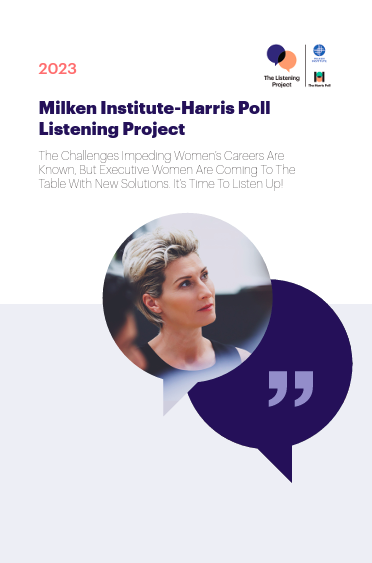
To download the 2023 Listening Project report, please click here.
This year we focus on gender inequity in corporate America. It is no secret that significant gaps exist in America’s workforce in compensation, representation, or opportunities for advancement. Yet women – especially women of color – express frustrations at all levels of the organizational chart, and the pace of change is slow despite a broad cultural conversation.
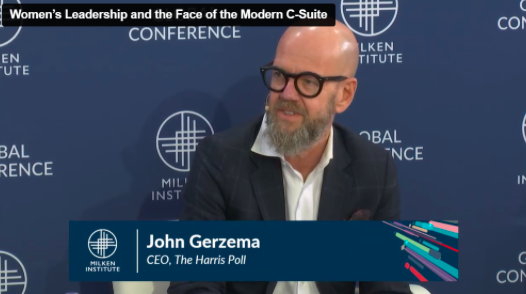
The Milken Global Conference May 2, 2023
Our CEO John Gerzema joined a panel (which you can watch here) with the CEO of BNY Mellon, Hanneke Smits, the Executive Director and CIO of the Dallas Employees’ Retirement Fund, Cheryl Alston, the President and CEO of the CDC Foundation, Judy Monroe, and the Managing Director of Prosek Partners, Katie O’Reilly. While the existing inequity problems are all too familiar, the solutions are not. With this research, we sought to identify what it takes to move the needle by isolating specific programs and policies executives tell us are potentially viable through trial and error in their firms.
To find these solutions at corporate levels, we listened to the voices at both ends of the spectrum; executive women in the Milken Institute Executive Circle – the women who have defied the odds and climbed to the top of the corporate ladder and employed American women (ages 22 to 41) who represent the next generation of leaders. Here’s what we found:
The Challenge Exists at All Levels in Women’s Leadership
Most (90%) of Gen Z/Millennial working women face challenges that impede their careers, such as the lack of career development, mentorship, and sponsorship. And at the top, executive women detail their three biggest frustrations regarding gender equity:
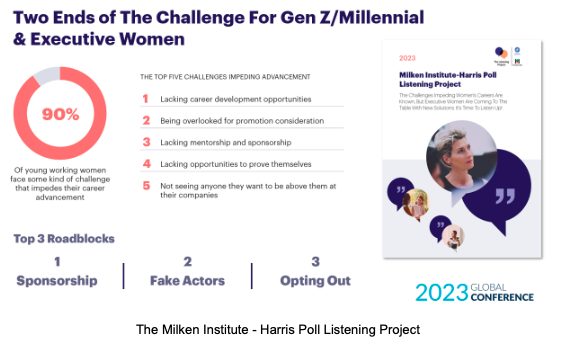
Core to Burnout: Raised by Professional Women
Business leaders agree that gender equity and DEI are good for business but fail to implement accountability to change the status quo. Here’s why:
- The “double shift” of feeling compelled to champion DEI alone on top of their job. Women feel they take on this mantle with no extra compensation, and it is often positioned as “non-core” adjacent work rather than mission-critical to the business.
- The presence of “female-washing” in corporations today, where nothing meaningful has changed behind closed doors.
- And say that the three most significant barriers to implementing gender parity are the lack of sponsorship and support, male allies who say they want to help but don’t act, and the opting out of executive women from a broken system.
Gen Z/Millennials Want To Champion Diversity Together
Fortunately, younger female (and male) professionals see the world differently:
- Being the leader they don’t see: 8 in 10 (82%) of Gen Z/Millennial working women want to be a new kind of leader that doesn’t resemble the ones we have today.
- And 7 in 10 (70%) Gen Z/Millennial workers feel it’s everyone’s responsibility to help women succeed in their careers (women: 70%, men: 70%) and that the status quo isn’t serving anyone well (72%, 70%).
- Gen Z/Millennial workers would be more willing to work for a company that holds its leadership accountable to DEI (women: 81%, men: 77%).
- And in turn, they would like to see the following initiatives implemented within the next year:
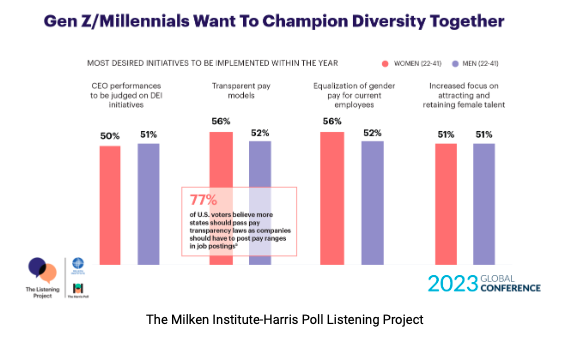
The Blueprint of Accountability
Our survey focused on feedback from professional women as the solutions to improve access and inclusivity. Across every operational level, businesses must enact accountability measures to move the needle forward, especially as (66%) of Gen Z/Millennial working women say their company says the right thing about DEI but has little action to back it up.
- Specifically, at the company level, executive women call actions such as identification, performance measurements, succession planning, and C-Suite tracking.
- Performance measurements – CEO and manager performance being linked to measurable DEI objectives.
- Social Capital Compensation – Quantifying DEI work with compensation, time allocation, and career track planning.
- Succession Planning – Requiring corporate bylaws to include female candidates.
- Transparent C-Suite Tracking – Assuring women aren’t regulated to “supporting” C-Suite titles or functions.
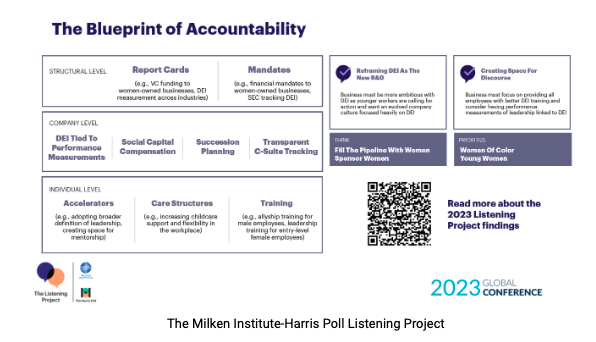
Where to Watch Us at MI Global
The Milken Institute and The Harris Poll shared the results from the 2023 “The Listening Project” during the 26th Milken Institute Global Conference, where our CSO Libby Rodney detailed our findings at the Women’s Executive Dinner while CEO John Gerzema presented during the “Women’s Leadership and the Face of the Modern C-Suite.” He also had the honor to moderate a panel, “Building Trust in The Age of Distrust.
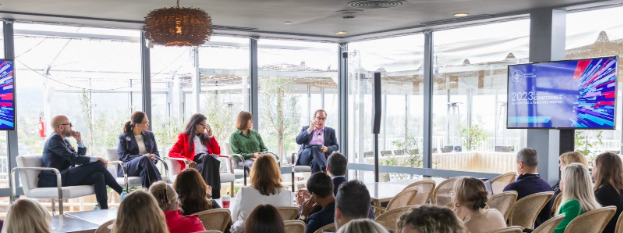
The Milken Global Trust Panel: John, Nazanin Ash, Judy Smith, Julianne Hughes-Jennet, and Eric Gertler
Follow the Global Conference on social media with #MIGlobal. And for more details on The Listening Project, prior reports, and our activities at Milken Global Conference 2022, please visit our Harris Poll-Milken Institute page, where we will continue to post updates.
Subscribe for more Insights
Subscribe to our newsletter for the latest trends in business, politics, culture, and more.
Download the Data
This survey was conducted online within the U.S. by The Harris Poll from April 28th to 30th among a nationally representative sample of 2,075 U.S. adults.
Download
Subscribe for more Insights
Subscribe to our newsletter for the latest trends in business, politics, culture, and more.
Download the Data
This survey was conducted online within the U.S. by The Harris Poll from April 28th to 30th among a nationally representative sample of 2,075 U.S. adults.
DownloadRelated Content







